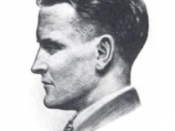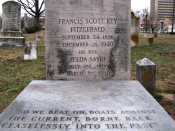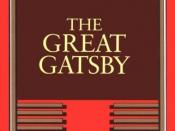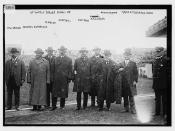May 24 3U English- The Great Gatsby Themes and Techniques Dialogue F. Scott Fitzgerald did a very unusual thing by having Nick Carraway as the narrator for The Great Gatsby. Having him tell the story means that the reader is subject to seeing everything through the eyes of Nick, whether these things are other characters, situations or events. Normally then, a novel might become incredibly boring after some time. For it seems that, in Nick's case especially, the people who he is writing about, in a sense all seem undeniably the same. Therefore, what needs to be looked at is how F. Scott Fitzgerald overcame this problem and ultimately, how he gave each character a voice.
Each character in The Great Gatsby was given a distinctive voice which set them apart from all the others. Not only were there telltale signs of character evident in their voices, but each voice reflected their desire to achieve what was their personal dream.
Collectively then, each voice contributed to the universal desire to achieve the "American Dream"ÃÂ.
Gatsby - pompous yet friendly "old sport"ÃÂ - reflective of the world that he has created for himself - is his voice a mask for his true sensitivity or feelings? Daisy - high pitched, tinkling "thrilling"ÃÂ, "full of money"ÃÂ - fake- "is this absolutely where you live my dearest one"ÃÂ- it could be said that words like "ÃÂabsolutely' are unnecessary and only for effect.
NB/ Even though Fitzgerald has given Daisy this voice, it still has an undertone of sadness to it. This tone really is reflective of her true feelings- that she's missed out on something important to her, and that she is undeniably unhappy.
Tom - very arrogant and self important "ÃÂ shown in his extensive use of "I"ÃÂ, "my"ÃÂ etc.
"it's a nice house I've got here"ÃÂ - booming - represents his character perfectly- ie the fact that he is heavy set, and his body is "cruel"ÃÂ Jordan - haughty and jaunty - brudish confidence In a way it seems that Jordan wishes to be noticed. This is emphasised by her obvious confidence but also in the fact that she cheated in golf. Fitzgerald has created her character to be seen as relatively unimportant, but in actual fact, to the narrator she is very important. This is another technique employed by Fitzgerald in terms of characterisation.
Myrtle - epitome of fake - her voice represents the fact that she wants be something that she can never be - representative of her character- reflective of materialism and the desire for material wealth and possessions.
Myrtle's voice is interesting. It is brash and loud yet still innocent. In a sense, her voice really does portray her naivety and also her desire to own something. This can be seen when she buys the puppy dog- she can now exercise her power over something.
Meyer Wolfshiem - profoundly Jewish We are told that he is Jewish, but had we not, his voice still sounds Jewish. His habits and mannerisms are profoundly stereotypically Jewish, that a reader may still be able to tune in to this.
Nick In a sense, Nick's voice is the most important of them all. Another group is looking at his narration, so without delving into it too much, Nick's voice really is that of a sensitive cynic. He is removed from the action in the novel- as in, he is involved but separate, ad despite his misgivings about the lifestyles of the rich, he still maintains some degree of sensitivity and sympathy. His voice is important as his dream is contrasted with that of the other characters. Their voices and dialogue are full of their intense desire to look good, to have everything they could have possibly ever dream of. Nick's voice is full of rationality- and reflects the fact that he is narrating the story from a first and third person's perspective at the same time.
The voices of the characters in The Great Gatsby really do reflect their desire to achieve the American Dream. In truth, it could be said that nobody knows what another person's true voice is like. Do we all put on voices, and personalities in order to alter other people's perception of us? Do we even know what our true voices are like? May 24 3U English- The Great Gatsby Themes and Techniques Dialogue F. Scott Fitzgerald did a very unusual thing by having Nick Carraway as the narrator for The Great Gatsby. Having him tell the story means that the reader is subject to seeing everything through the eyes of Nick, whether these things are other characters, situations or events. Normally then, a novel might become incredibly boring after some time. For it seems that, in Nick's case especially, the people who he is writing about, in a sense all seem undeniably the same. Therefore, what needs to be looked at is how F. Scott Fitzgerald overcame this problem and ultimately, how he gave each character a voice.
Each character in The Great Gatsby was given a distinctive voice which set them apart from all the others. Not only were there telltale signs of character evident in their voices, but each voice reflected their desire to achieve what was their personal dream. Collectively then, each voice contributed to the universal desire to achieve the "American Dream"ÃÂ.
Gatsby - pompous yet friendly "old sport"ÃÂ - reflective of the world that he has created for himself - is his voice a mask for his true sensitivity or feelings? Daisy - high pitched, tinkling "thrilling"ÃÂ, "full of money"ÃÂ - fake- "is this absolutely where you live my dearest one"ÃÂ- it could be said that words like "ÃÂabsolutely' are unnecessary and only for effect.
NB/ Even though Fitzgerald has given Daisy this voice, it still has an undertone of sadness to it. This tone really is reflective of her true feelings- that she's missed out on something important to her, and that she is undeniably unhappy.
Tom - very arrogant and self important "ÃÂ shown in his extensive use of "I"ÃÂ, "my"ÃÂ etc.
"it's a nice house I've got here"ÃÂ - booming - represents his character perfectly- ie the fact that he is heavy set, and his body is "cruel"ÃÂ Jordan - haughty and jaunty - brudish confidence In a way it seems that Jordan wishes to be noticed. This is emphasised by her obvious confidence but also in the fact that she cheated in golf. Fitzgerald has created her character to be seen as relatively unimportant, but in actual fact, to the narrator she is very important. This is another technique employed by Fitzgerald in terms of characterisation.
Myrtle - epitome of fake - her voice represents the fact that she wants be something that she can never be - representative of her character- reflective of materialism and the desire for material wealth and possessions.
Myrtle's voice is interesting. It is brash and loud yet still innocent. In a sense, her voice really does portray her naivety and also her desire to own something. This can be seen when she buys the puppy dog- she can now exercise her power over something.
Meyer Wolfshiem - profoundly Jewish We are told that he is Jewish, but had we not, his voice still sounds Jewish. His habits and mannerisms are profoundly stereotypically Jewish, that a reader may still be able to tune in to this.
Nick In a sense, Nick's voice is the most important of them all. Another group is looking at his narration, so without delving into it too much, Nick's voice really is that of a sensitive cynic. He is removed from the action in the novel- as in, he is involved but separate, ad despite his misgivings about the lifestyles of the rich, he still maintains some degree of sensitivity and sympathy. His voice is important as his dream is contrasted with that of the other characters. Their voices and dialogue are full of their intense desire to look good, to have everything they could have possibly ever dream of. Nick's voice is full of rationality- and reflects the fact that he is narrating the story from a first and third person's perspective at the same time.
The voices of the characters in The Great Gatsby really do reflect their desire to achieve the American Dream. In truth, it could be said that nobody knows what another person's true voice is like. Do we all put on voices, and personalities in order to alter other people's perception of us? Do we even know what our true voices are like?





